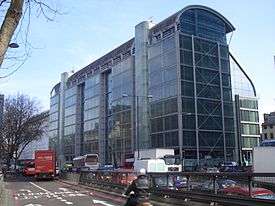Austin Smith (biologist)
| Austin Smith | |
|---|---|
| Born |
Austin Gerard Smith 1960 (age 55–56) Merseyside, United Kingdom [1] |
| Residence | Cambridge, UK |
| Citizenship | United Kingdom |
| Nationality | United Kingdom |
| Fields | Stem Cells |
| Institutions | University of Cambridge |
| Alma mater | University of Edinburgh |
| Thesis | (1986) |
| Doctoral advisor | Martin Hooper |
| Notable awards | Louis-Jeantet Prize for Medicine [2] |
|
Website www | |
Austin Gerard Smith (born 1960) is a professor in the Department of Biochemistry and director of the Wellcome Trust Centre for Stem Cell Research at the University of Cambridge.[3] He is notable for his pioneering work on the biology of embryonic stem cells.[4][5]
Education
Austin Smith obtained his doctoral degree from the University of Edinburgh in 1986.[3]
Career and research
He then carried out postdoctoral research at the University of Oxford, before joining the Centre for Genome Research at the University of Edinburgh as a group leader.[3] In 1996, he was appointed director of the Centre, which became the Institute for Stem Cell Research under his leadership.[3] He remained as director of the Institute until his move to Cambridge in 2006.[6]
In 2003, Smith was awarded an MRC Research Professorship[3] and elected to the Royal Society of Edinburgh.[7] And in 2006, was elected a Fellow of the Royal Society.[8] In 2010, he was co-recipient of the Louis-Jeantet Prize for Medicine along with French cardiologist Michel Haissaguerre.[2]
In February 2010, together with 13 other leading stem cell researchers, he wrote an open letter to journal editors to voice the opinion that obstructive reviews by a small number of researchers in the field were hindering publication of novel stem cell research.[9] [10]
Austin Smith will be the director of the new Wellcome Trust-MRC Cambridge Stem Cell Institute at the University of Cambridge, which will be established with 8 million pounds ($12.5 million) awarded by the Wellcome Trust and Medical Research Council (UK) in 2012.[11]
References
- ↑ http://www.jeantet.ch/e/winners/smith-austin.htm[]
- 1 2 http://www.eurekalert.org/pub_releases/2010-01/embo-2lp012510.php
- 1 2 3 4 5 6 http://www.stemcells.cam.ac.uk/researchers/principal-investigators/pressor-austin-smith
- ↑ "The Stars of Europe – Innovators: Austin Smith, Director, Centre for Genome Research". Businessweek. 17 June 2002. Archived from the original on 2008-05-31.
- ↑ "New Safer Way Developed To Reprogram Stem Cells". Science Daily. 3 March 2009.
- ↑ "Stage set for world-leading stem cell research centre". Wellcome Trust. Retrieved 5 September 2012.
- ↑ "RSE Fellows as at 12/04/2011" (PDF). Royal Society of Edinburgh. Archived (PDF) from the original on 17 May 2011. Retrieved 26 April 2011.
- ↑ "Fellows". Royal Society. Archived from the original on 30 November 2010. Retrieved 4 December 2010.
- ↑ "Open letter to Senior Editors of peer-review journals publishing in the field of stem cell biology". Retrieved 5 September 2012.
- ↑ Ghosh, Pallab (2 February 2010). "Journal stem cell work 'blocked'". BBC News.
- ↑ "Cambridge Joins Harvard In Opening Stem-Cell Institute". Bloomberg News. 8 August 2012.
